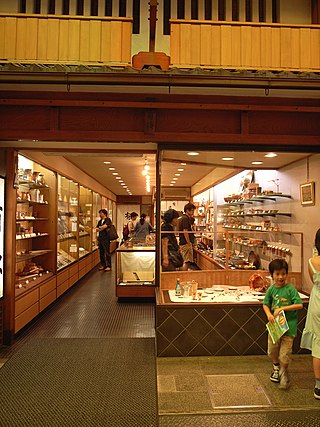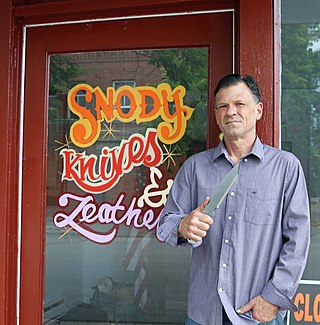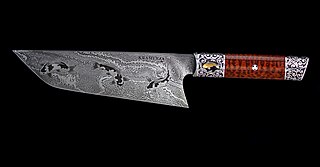Related Research Articles

A utility knife is any type of knife used for general manual work purposes. Such knives were originally fixed-blade knives with durable cutting edges suitable for rough work such as cutting cordage, cutting/scraping hides, butchering animals, cleaning fish scales, reshaping timber, and other tasks. Craft knives are small utility knives used as precision-oriented tools for finer, more delicate tasks such as carving and papercutting.

Deba bōchō are Japanese style kitchen knives primarily used to cut fish, though also used when cutting meat. They come in different sizes, sometimes up to 30 cm (12 inches) in length. The deba bōchō first appeared during the Edo period in Sakai. It is designed to behead and fillet fish. Its thickness, and often a more obtuse angle on the back of the heel allow it to cut off the heads of fish without damage. The rest of the blade is then used to ride against the fish bones, separating the fillet.

A Japanese kitchen knife is a type of a knife used for food preparation. These knives come in many different varieties and are often made using traditional Japanese blacksmithing techniques. They can be made from stainless steel, or hagane, which is the same kind of steel used to make Japanese swords. Most knives are referred to as hōchō or the variation -bōchō in compound words but can have other names including -kiri. There are four general categories used to distinguish the Japanese knife designs: handle, blade grind, steel, and construction.

Nakiri bōchō and usuba bōchō are Japanese-style vegetable knives. They differ from the deba bōchō in their shape, as they have a straight blade edge suitable for cutting all the way to the cutting board without the need for a horizontal pull or push. These knives are also much thinner. While the deba bōchō is a heavy blade for easy cutting through thin bones, the blade is not suitable for chopping vegetables, as the thicker blade can break the vegetable slice. The nakiri bōchō and the usuba bōchō have a much thinner blade. This does not help with cutting small bones in fish or meat, but is useful for cutting vegetables.

The Opinel company has manufactured and marketed a line of eponymous wooden-handled knives since 1890 from its headquarters in Saint-Jean-de-Maurienne, Savoie, France where the family-run company also operates a museum dedicated to its knives. The company sells approximately 15 million knives annually. Opinel knives are made of both high carbon and stainless steel, the latter being Sandvik steel from Sweden.

A kitchen knife is any knife that is intended to be used in food preparation. While much of this work can be accomplished with a few general-purpose knives – notably a large chef's knife, a tough cleaver, a small paring knife and some sort of serrated blade – there are also many specialized knives that are designed for specific tasks. Kitchen knives can be made from several different materials.
In cooking, a chef's knife, also known as a cook's knife, is a cutting tool used in food preparation. The chef's knife was originally designed primarily to slice and disjoint large cuts of beef. Today it is the primary general-utility knife for most Western cooks.

The Santoku bōchō or Bunka bōchō (文化包丁) is a general-purpose kitchen knife originating in Japan. Its blade is typically between 13 and 20 cm long, and has a flat edge and a sheepsfoot blade that curves down an angle approaching 60 degrees at the point. The term Santoku may refer to the wide variety of ingredients that the knife can handle: meat, fish and vegetables, or to the tasks it can perform: slicing, chopping and dicing, either interpretation indicating a multi-use, general-purpose kitchen knife. The Santoku's blade and handle are designed to work in harmony by matching the blade's width and weight to the weight of the tang and the handle.

Ginsu is a brand of direct marketed knives. The brand is owned by the Douglas Quikut Division of Scott Fetzer, a Berkshire Hathaway Company. The brand was heavily promoted in the late 1970s and 1980s on U.S. television using infomercials characterized by hawker and hard sell pitch techniques. The commercials generated sales of between two and three million Ginsu sets between 1978 and 1984.
WÜSTHOF is a knife-maker based in Solingen, Germany. Family owned for seven generations, the company's main products are mid-priced to high-end kitchen knives for domestic and professional use. WÜSTHOF is one of the leading manufacturers of chef's knives.

Sharpening is the process of creating or refining the edge joining two non-coplanar faces into a converging apex, thereby creating an edge of appropriate shape on a tool or implement designed for cutting. Sharpening is done by removing material on an implement with an abrasive substance harder than the material of the implement, followed sometimes by processes to polish/hone the sharp surface to increase smoothness.

GLOBAL is a Japanese brand of kitchen knives and accessory tools owned and manufactured by the Yoshikin factory of Japan. The Yoshikin Factory is owned by the Watanabe family and located in Tsubame, Japan.
Kershaw Knives designs, sources and manufactures a wide range of knives, including pocketknives, sporting knives, and kitchen cutlery. Kershaw is a brand of Kai USA Ltd., a member of the KAI Group, headquartered in Tualatin, Oregon, United States.
Füritechnics Pty Ltd is an Australian manufacturer and developer of kitchen knives that sells under the abbreviated name Füri.

Aritsugu is a Japanese knife and cooking utensil producer and store, founded by Fujiwara Aritsugu in 1560. It is one of the oldest knifemakers in Japan.

A steak knife is a sharp table knife designed to efficiently and effectively cut steak. This type of knife comes in a variety of styles and sizes; however, the design often used in a steakhouse typically features a partially serrated blade and wood handle.

Al Mar Knives is a production knife company headquartered in Tualatin, Oregon, United States. Al Mar Knives was established in 1979 by Al Mar, and has a reputation for making tactical knives of innovative design. While headquartered in the United States, Al Mar knives were made in Seki City of Japan from 1979 to 2019.

Mike Snody is a Southern Texas knife maker who is known for his use of exotic materials in his custom knives. He is currently based in Walsenburg, Colorado.

Bob Kramer is an American bladesmith, "widely considered the greatest American knifesmith working today". Some consider his kitchen knives to be "the best in the world". His first knife shop in Seattle, Bladesmiths, opened in 1993. As of 2017 he forges steel and makes knives in Bellingham, Washington.

Shun Cutlery is a kitchen knife brand of the KAI Group, headquartered in Tokyo, Japan. In the United States, Shun is sold by Kai USA in Tualatin, Oregon—alongside the Kershaw Knives and Zero Tolerance Knives brands.
References
https://blog.resy.com/2023/03/saori-kawano-korin/
- ↑ "How to Succeed at Knife-Sharpening Without Losing a Thumb" New York Times , September 23, 2006. Accessed September 23, 2006.
- ↑ Williamson, Elizabeth (February 26, 2011). "Cooking for the Commander in Chief". The Wall Street Journal. Retrieved June 22, 2015.